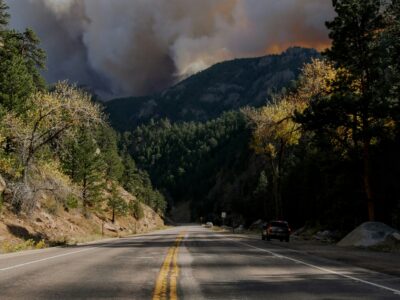Rescuing FEMA (and ourselves)
FEMA needs to grow in order to handle its work. The need for growth will only get greater as time goes on.
2021 was a year of disasters, with extraordinary heat waves, fires, a string of hurricanes, a cold snap that left Texas in the dark, winter tornados, and torrential rains. FEMA has been left badly overstretched. That’s an urgent problem, and it’s likely a foretaste of the future.
This is not just a problem for the overloaded folks at FEMA. It’s a problem for all of us, in an era where disasters are coming fast and furious.
The agency is stretched very thin indeed, with duties ranging from assisting with the care of detained migrant children, responding to COVID, supervising funding for rebuilding from past storms, and preparing for the upcoming season of wildfires and hurricanes. In May, according to the NY Times, “just 3,800 of the agency’s 13,700 emergency workers are available right now to respond to a new disaster,” about a third fewer than last year. The problem, the Times says, was not so much a lack of funding as a lack of staff.
Some of FEMA’s current assignments, like COVID response, are temporary. There’s every reason, however, to expect the pace of disaster situations to increase rather than slow. There are three reasons.
First and foremost, there’s climate change, which will result in an increase in the frequency and intensity of extreme weather events. The increase in frequency also means that there will be a greater number of disaster clusters, meaning that FEMA will be faced with multiple major disasters in short spans of time. The increased severity of disasters will also complicate and extend the post-disaster response, requiring corresponding commitments of staff by FEMA.
Second, more people leave in high-risk areas such as coastal areas. The growing populations of Florida and Texas are especially exposed to hurricane and flood risks, and they account for an outsized share of the biggest disasters in monetary terms. There’s also been a lot of population growth in arid areas and on the urban wildland interface, putting more people at risk from wildfires.
Third, disaster cascades are becoming more of a problem. The causes are complex. Due to climate change, systems designed for the previous weather regime are now exposed to unexpected risks of failure. Systems are also highly interlinked. In Texas, we saw how the dynamics at play. Gas supply failed because the facilities weren’t weatherized to deal with the unexpected cold weather. That in terms knocked out parts of the electrical system. Further gas systems then failed because of lack of power, and this impaired additional parts of the electrical system. Finally, much of the power grid had to be taken off line because of the system’s increasing instability. And to top all this off, the water supply failed in many places because of the lack of power, while Texans shivered in cold houses. These cascading failures increase the challenges for disaster response.
What’s to be done? Congress needs to authorize a substantial increase in FEMA’s staff, and such increases will probably have to continue over the years as the disaster situation gets worse. FEMA is going to be a much bigger agency in 2050 than it is today. FEMA also needs to be able to access more help within the federal government, which may mean additional hiring in other parts of the government, as well as additional disaster training and preparedness. State governments are going to be facing similar problems. Texas and Florida have large economies. Other impacted states like Mississippi are among the poorest in the country and will need federal help to develop their disaster response capabilities. Finally, FEMA may need additional budget authority for outside contractors who can provide additional surge capacity.
It would be nice if we were just going through a temporary blip, but the reality is that we are just at the beginning of an era of increasing disaster risk. The means that disaster risks will occupy a bigger share of the government’s attention. FEMA and its state counterparts will need to grow along with the scale of the disaster risks they confront.
Reader Comments
5 Replies to “Rescuing FEMA (and ourselves)”
Comments are closed.






Beyond disaster response and building in preventative resilience and adaptation, permanent sea level rise will soon be requiring massive abandonment and relocation inland to higher ground. Beyond just national FEMA insurance and grants, can you or a colleague address the legal issues facing coastal governments at each level in managing this huge social and infrastructure problem? Or recommend the best book on it?
Richard — RAND has done some interesting work on coastal issues that you might look at. There’s also an NAS report that covers a lot of ground. https://www.nap.edu/resource/25383/interactive/. Probably the most hotly discussed issue on the legal side is managed report. This looks like a good literature review. https://www.sciencedirect.com/science/article/pii/S2212096321000668
A most interesting kind of problem you highlight here Dan. A similar fact of life today is that universities focus too much on individual disciplines in an era of most destructive problems where:
Climate Change, Pandemics, Overthrow of Democracies, International Relations Failures, Overwhelming Us/Them Dichotomies, and The Power of Money are paramount facts of life that threaten to destroy our civilization today.
We most desperately need to dedicate Berkeley to multidisciplinary studies to Save the Human Race TODAY when our civilization must have leaders who can solve multidisciplinary problems before time runs out on us, the way we do things now is not working as current events prove daily.
Anthony – You should take a look at Berkeley’s Energy and Resources Group, erg.berkeley.edu. It’s exactly the kind of interdisciplinary program that you’re talking about.
Great News Dan, do they also get into subjects like disease, politics, polsci, psychology, sociology, etc. that will enable them to produce and implement solutions to Save The Human Race before we run out of time?
Considering the disasters we are experiencing and facing they should be the largest best resourced group on the campus.